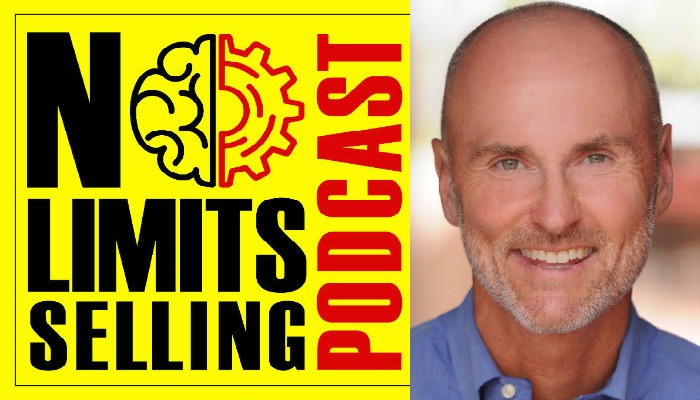How to Benefit from The Modern Elder by Chip Conley
On Episode 170 of The No Limits Selling Podcast, we have Chip Conley, Founder and CEO at Modern Elder Academy (MEA), NYT Best-Selling Author, and Speaker. In this episode, Chip shares with us tips on how to reignite your passion.
New York Times bestselling author Chip Conley is the boutique hotel entrepreneur who helped Airbnb's founders turn their fast-growing tech start-up into a global hospitality brand. Chip is the founder of the Modern Elder Academy, where a new roadmap for midlife is offered at a beautiful oceanfront campus in Mexico. MEA will be opening up its first U.S. MEA Regenerative Community outside of Santa Fe, New Mexico in 2023.
New York Times bestselling author Chip Conley is the hospitality maverick who helped Airbnb's founders turn their fast-growing tech start-up into a global hospitality brand. In Wisdom@Work: The Making of a Modern Elder he shares his unexpected journey at midlife — from CEO to intern — learning about technology as Airbnb’s Head of Global Hospitality and Strategy, while also mentoring CEO Brian Chesky.
Chip is the founder of the Modern Elder Academy, where a new roadmap for midlife is offered at a beautiful oceanfront campus in Baja California Sur, Mexico. He serves on the board of Encore.org and the advisory board for the Stanford Center for Longevity. www.ChipConley.com

Contact Chip:
[EDITOR’S NOTE: This podcast is sponsored by No Limits Selling. It is a fun, fast-paced podcast that delivers hard-fought business advice that you can implement today to improve your sales and performance]
Interested In Our Real Estate Coaching Services? Explore Our Website: Link
Feeling Not Well Today? You Can Use Our Mindset Boosters App To amp Up Your Mood: Link
Find us on Social Media:
LinkedIn | Facebook community | Instagram
Like what do you listen to? Subscribe to our podcast!
Ready to become fearless? We can help you become fearless in 60 days so you accomplish more in your career Schedule A 15 min Call with Umar
Summary
Introduction and Chip's Background
The podcast opens with an introduction of Chip Conley, a renowned entrepreneur and author, who has made significant contributions to the hospitality industry and the concept of aging in the workplace. Chip Conley is a New York Times bestselling author, the founder of Modern Elder Academy, and a strategic advisor for Airbnb. He shares his journey, starting from his early days in the hotel industry where he founded Joie de Vivre Hospitality at the age of 26. He also discusses his role at Airbnb, detailing how he became involved with the company and the unique insights he brought to its operations.
Modern Elder Academy
The conversation then shifts to the Modern Elder Academy, an innovative institution that Chip started in Baja, Mexico. The academy is specifically designed for individuals in midlife who are looking to navigate transitions in their personal and professional lives. Chip elaborates on the concept of a "modern elder," which he defines as a new kind of elder who brings wisdom to modern technologies and ideas, contrasting it with the traditional notion of an elder as someone who is merely old and often out of touch with contemporary society.
Wisdom at Work
Chip then delves into his book, "Wisdom at Work: The Making of a Modern Elder." In this work, he shares his experiences and insights on aging and wisdom in the workplace. He emphasizes the importance of intergenerational collaboration, arguing that older workers can bring immense value to a company through their experience and wisdom. He suggests that the modern workplace can benefit from a symbiotic relationship between the digital intelligence of the younger generation and the wisdom of the older generation.
Conclusion
In this insightful podcast, Chip Conley, a New York Times bestselling author and the founder of Modern Elder Academy, shares his rich experiences and innovative ideas about aging and wisdom in the modern workplace. Starting from his early entrepreneurial journey in the hotel industry to his strategic advisory role at Airbnb, Conley emphasizes the value of intergenerational collaboration and lifelong learning. He introduces the concept of a "modern elder," who, unlike traditional elders, brings wisdom to modern technologies and ideas.
Through his Modern Elder Academy, he provides a platform for midlife individuals to navigate their personal and professional transitions. Drawing from his book, "Wisdom at Work: The Making of a Modern Elder," he advocates for a symbiotic relationship between the digital intelligence of the younger generation and the wisdom of the older generation. Conley's vision for the future of work is one where age and wisdom are valued alongside youth and innovation, fostering a culture of mentorship and shared wisdom.
Questions & Answers
Who is Chip Conley?
What is the Modern Elder Academy?
What is the concept of a "modern elder"?
What is the main theme of Chip Conley's book "Wisdom at Work: The Making of a Modern Elder"?
What advice does Chip Conley offer to listeners?
What is Chip Conley's vision for the future of work?
How can I learn more about Chip Conley's work and the Modern Elder Academy?
Don’t miss this opportunity to transform your real estate career with one-on-one coaching. As an experienced real estate coach, I, Umar Hameed, am dedicated to helping you unlock your full potential and achieve your real estate goals. To learn more about who am I and my clients ↓
If you’re ready to take the next step, book an appointment with me today and begin your journey toward success in the real estate industry.
